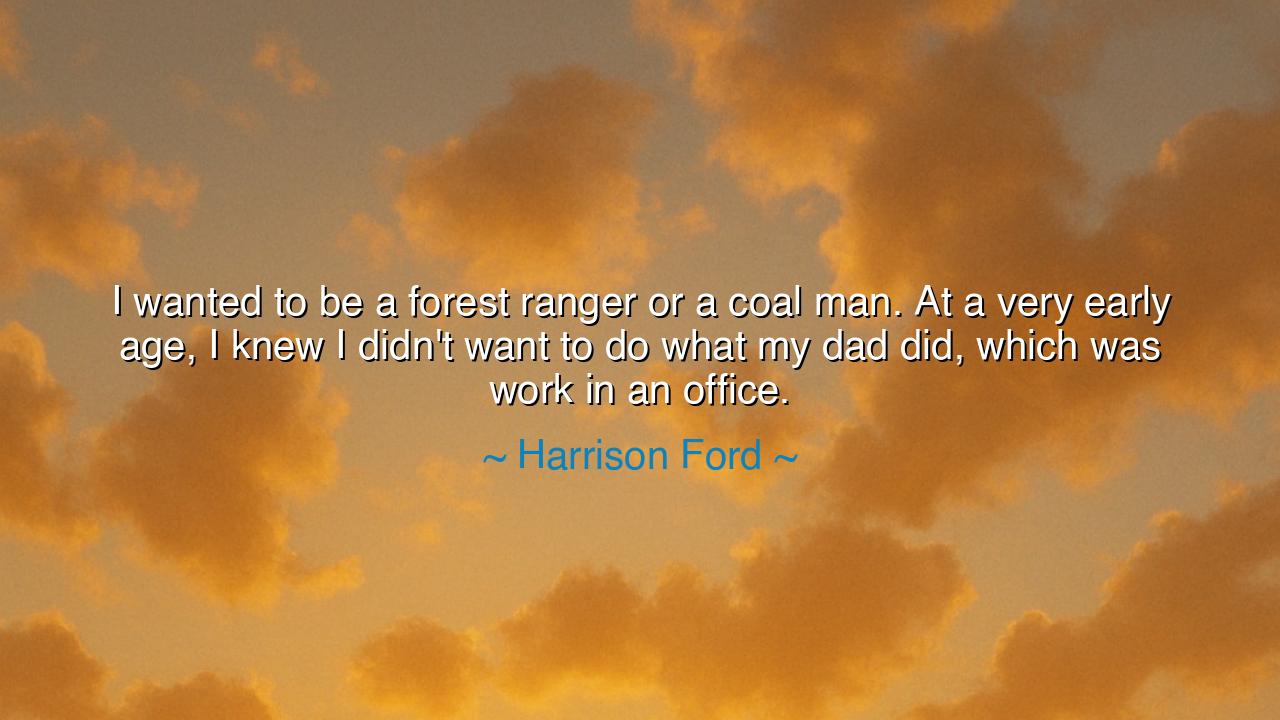
I wanted to be a forest ranger or a coal man. At a very early
I wanted to be a forest ranger or a coal man. At a very early age, I knew I didn't want to do what my dad did, which was work in an office.






From the earliest stirrings of youth, there often arises within the heart of an individual a deep, undeniable calling, a voice that pulls them toward a life that is theirs to shape—one that diverges from the paths that others have laid before them. Harrison Ford, the famed actor whose life was defined by roles of daring adventure and quiet reflection, reveals a glimpse into his own early inclinations with the words: "I wanted to be a forest ranger or a coal man. At a very early age, I knew I didn't want to do what my dad did, which was work in an office." These words, though simple, speak volumes about the nature of the human spirit and its deep-seated need to forge its own identity, to follow a path that resonates with its true self.
The ancient philosophers, too, understood this calling that stirs the soul and directs it toward a destiny that transcends mere occupation. Socrates, for example, rejected the life of a traditional citizen, choosing instead the life of a philosopher—one who questioned, sought truth, and challenged the established order. His decision to leave behind the comforts and expectations of a conventional life was not an act of rebellion for rebellion's sake, but an act of deep conviction that his purpose lay elsewhere. In much the same way, Ford’s choice to pursue a path outside of his father's office-bound existence is an act of personal authenticity—one that shows us that the pursuit of meaning and purpose often demands that we step away from the comfortable and familiar.
Consider also the story of Leonardo da Vinci, whose early aspirations were not confined to being a painter but extended to a multitude of fields: from engineering to anatomy to sculpture. Da Vinci, despite his immense talent in the arts, was not content with a single, predetermined path. He sought a life that embraced a variety of interests, pursuing knowledge in every direction that sparked his curiosity. Ford's yearning for a life in nature, either as a forest ranger or coal man, mirrors this same spirit of exploration and seeking. Both sought lives that were untethered from societal expectations and shaped instead by their own passions and inner desires.
In Ford’s rejection of his father’s office-bound life, we see a powerful example of the individual spirit refusing to be confined by the roles and paths that others expect us to follow. The story of Abraham Lincoln, who was born into humble surroundings and faced immense challenges, also reflects this spirit. Lincoln, despite his early education being minimal and his family’s modest station, sought a life of learning and leadership. He did not conform to the life his family might have expected for him; instead, he carved a new path—one that led him to the presidency and to becoming one of the most revered figures in American history. Just as Ford followed a path that allowed him to live authentically, so too did Lincoln find the strength to step away from his origins to fulfill a greater purpose.
The lesson embedded in Ford's words is that purpose is not handed down to us; it is something we must discover and choose for ourselves. Youth is a time of deep questioning, and the wisdom of the ancients teaches us that it is not enough to follow the expectations of others. Instead, we must listen to the voice within, the voice that calls us to our own unique journey. Just as Ford longed for the wide expanse of nature, and just as Socrates sought wisdom in places outside of the conventional, so must we recognize that the greatness of a life lies in the ability to follow our inner compass rather than the prescribed paths of others.
In the world we inhabit, it is all too easy to fall into the rhythm of society’s expectations—to take on the roles and identities handed to us without question. But true fulfillment comes not from living for the approval of others, but from embracing our own truth. As Ford has shown us through his own life, it is not always the familiar, predictable path that leads to greatness. It is the path that aligns with our deepest desires, our true calling, and our willingness to take risks and seek out what truly makes our hearts come alive.
Therefore, let us take Ford's story as a beacon of inspiration. Let us reject the idea that we must be confined by tradition or the roles set before us by others. We are called to live lives that resonate with our passions, to seek out work that brings meaning, and to embrace the freedom of forging a path that is uniquely our own. Whether as a forest ranger, a coal man, or an artist, the call is the same: live authentically, seek your own truth, and do not let the expectations of others define your journey. Let your life be a testament to the power of choice—a choice that is made not out of conformity, but from the deep understanding that only in following our true purpose do we truly live.






AAdministratorAdministrator
Welcome, honored guests. Please leave a comment, we will respond soon